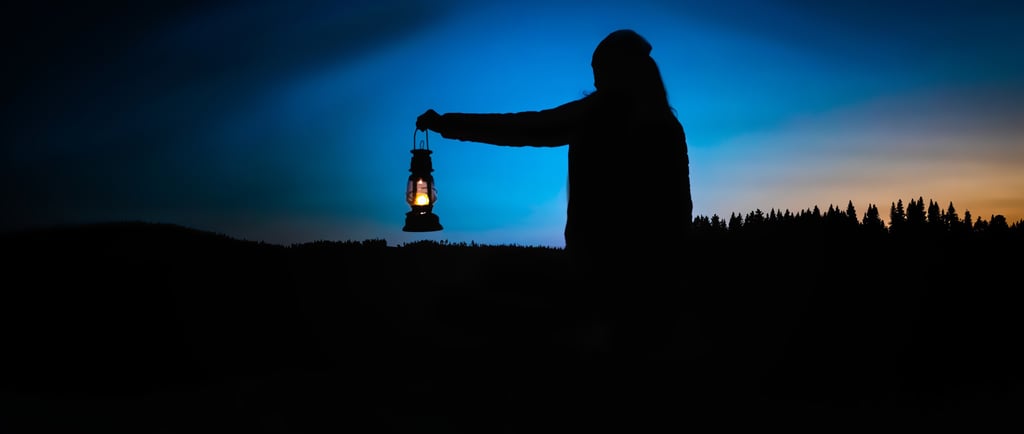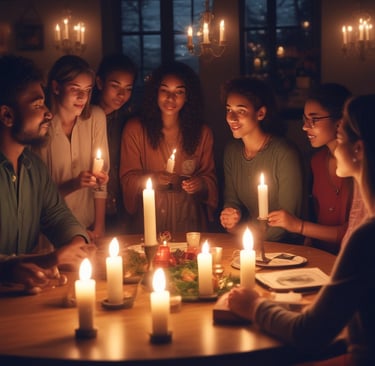From Higher Ed to Deeper Ed
Pronoia Academy brings the best of higher ed outside the walls of academia to make it affordably available to those seeking tools for creative change.
5/8/20246 min read


What is Pronoia Academy?
The world needs a new kind of change agent who can work culturally, psychologically, and philosophically, in the tradition of the humanities, by wielding imagination, story, inspiration, creativity, wisdom, hope, and dream to open possibilities, question old narratives, and inspire. We need revolutionaries of the heart, creatives of the soul, and restoryers of our place in the natural world. We need worldview therapy and a new mythology.
Pronoia Academy is a proposed nonprofit “labrastory,” deep education hub, think tank (imagine tank), and cultural sanctuary for educating and supporting lamplighters: visionary learners, depth mentors, creatives, healers, and leaders heralding good change in the world by reimagining the guiding stories that organize our worldviews.
Lamplighters explore the hidden dream, vision, meaning, or calling in troubling events. Lamplighters also foster cultural and personal transformation by expanding constricting narratives and the imaginings that support them to let in counter-narratives, possibilities, and inspirations from the edges of culture and consciousness. We rise to our full human stature by what we welcome back into consciousness.
The need and the problem(s):
Record levels of confusion and emotional exhaustion assail activists, leaders, climate scientists, educators, psychotherapists, and others who wonder what good their work actually does. It is more than burnout like the kind studied among activists by Dr. Paul Gorsky, Laurence Cox, or Lucas Mazur; resources of various kinds are available for that (see also the Audre Lorde Project).
The underlying problem surfaced in a 2022 study by Abramof and Peixoto: “People [in the West] have lost their ancestors, their territories, their gods, and assume a private life where they find themselves helplessly entangled in their problems.” Our culture of hyper-individualistic materialism has unmoored us from the inner, social, and natural worlds. This is not a new problem, but it is a growing one with serious consequences at many levels.
Furthermore, as Thomas Berry, Brian Swimme, and others have observed, we have no overarching “mythology” left: no frame of orientation, ideal, and aspiration. Patriarchal religion is outworn for many, and materialism offers no meaning. How are leaders, educators, and healers to serve without such internal resources? How are we all to flourish without a worldview adequate for our troubled time?
Our philosophy of lasting change:
At least two things are needed to make systemic change: supporting the change-makers; and assembling more spacious worldviews. Both require imagination. It’s hard to get to a better place if we can’t imagine it.
Imagination isn’t just something we do for fun. It is the foundation of our humanity. Every project, reform, or successful step forward began as a fantasy that someone felt compelled to collaborate on. My second PhD dissertation focused on imagination as a tool for change.
Appeals to fear and depressing facts and numbers only appeal to the convinced. But visions of how things could be, arising from injustice and rupture to offer glimpses of better possibilities, local or beyond, stir enthusiasm. They pull us instead of pushing us. Although clear on injustices, Dr. Martin Luther King didn’t motivate with “we’re victims”; he invoked the Beloved Community and shared his imaginings about the future.
In 2017, I coined the word “enchantivism” to describe this kind of aspirational storytelling and to highlight the impact of “post-heroic” activism. Here are a few examples of it:
Nichelle Nichols was praised for playing Star Trek’s Uhura by Martin Luther King Jr. Black astronaut Mae Jemison credits Nichols with inspiring her career.
Jacqueline Suskin saved a stand of redwoods by writing poems for the CEO of the logging company preparing to cut them down. Later, she helped design for him a permaculture dwelling.
Namina Forms, author of The Gilded Ones, loved Tolkien’s The Lord of the Rings, but she found no one in Middle-earth who looked like her. She drew upon the folklore of her beloved but war-riven Sierra Leone to write fantasy epics featuring Black and brown women. (Environmental activists often cite Tolkien.)
Ari Honavar notes that even before the COVID-19 pandemic videos of Iranian doctors dancing in hospitals and Italian residents singing from balconies, Persians chanted Rumi – “I am the sultan of love!” – during the Iran-Iraq War. “Those of us who lived through the fundamentalist power grab in Iran experienced a revolution of joylessness. Perhaps the most radical act of resistance in the face of adversity is to live joyfully.”
Australian Aboriginal rainmaking singers offer workshops for both preserving their own languages and bringing comfort in the wake of the terrible climate change fires ravaging the continent. The songs are about survival and hope.
We often think lasting change only comes about through pain and suffering. It can. But it can also grow from inspiration, hope, creativity, wisdom, storytelling, dreamworking, and nature contact. Visions of what could be motivate. Deeply felt causes—not facts—mobilize.
Why stories and storytelling?
Neuroscience and social science research show that in many cases, sharing stories—in whatever media—is more effective at uniting people, persuading change, tearing down walls, and moving forward together than protest, debate, or argument. Our very sense of self, individually and collectively, takes the form of internal guiding stories. Philosophers call these “worldviews.” If we want a different world to live in, we need to know how to grow more spacious worldviews.
The Academy will educate experts on the lore (guiding stories; unconscious forces; worldviews) by which we navigate life, work, identity, and relationships. Understanding this lore opens us up to larger realms of experience. It is time to gather the loreweavers of new stories, the bringers of engaged wisdom, the lighters of new beacons.
In this work, we don’t use stories as allegories for direct persuasion, but as sources of wisdom and inspiration for building relationships.
From Actual to Possible to Actualized
Using imagination to sense the rise of inspiring visions that inform new guiding stories awakens the soul, enlists the mind, and practices xenia: “hospitality,” which when denied to the stranger (zenos) results in xenophobia. Our salvation at every level is in what we welcome back, outwardly and inwardly, allowing it to expand our guiding lore (saga, worldview, loreway) and therefore our range of choices.
Imagination is key because everything humanity discovers, plans, repairs, and builds depends on it. To be vital and creative, imagination must be liberated from outward demands long enough to go exploring freely and alchemize on its own.
In making place for possibility, Lamplighters are visionary, psychologist, philosopher, bard, and detective rolled into one. They are loreweavers, enchantivists, deep educators, loreosophers, story change mentors, reimaginers, restoryers, unstoryers, practical dreamers, worldview therapists, sages of soul, Round Table Knights of the World Soul, and heralds of hope. Alone or together, lamplighters conjure beyond the actual by illuminating the possible.
The organization:
Pronoia Academy will be a nonprofit. I am starting to recruit board members. My goal is to have a modest-sized and diverse board of people with many kinds of expertise. My own eventual role will be as President and CEO. I’ve also started putting together an informal council of mentors.
The name Pronoia refers to 1. the far-seeing wife of bold Prometheus, 2. a Gnostic wisdom goddess who brought light repeatedly to the lower world, and 3. in English usage, the opposite of “paranoia.” We all belong on this planet together.
Pronoia Academy’s mission will be to train practitioners of engaged (“Pronoian”) wisdom in service to lasting cultural and personal transformation. By doing this, we will prototype outside higher ed a new kind of school for applied wisdom while highlighting good work already being accomplished.
The learning format:
The deep education arm of the Academy will be hybrid: online through live engagement, and in-person eventually at the Commonweal retreat facility. We will offer certificates, online video and Zoom classes, and various other resources for inspiring and supporting change.
The Academy will pool research on imagination, storytelling, wisdom, play, and the transformative role of the humanities. (I have made a start on this.) As a think tank, the Academy will also be an imagine, intuit, vision, and feel tank for nurturing gnosis: wise, deep, and direct consciousness of inner and outer reality.
Lampcove is a moderated community will be for visionaries and dreamers—lamplighters—in touch through discussion posts, community gatherings, chats, videos, and various live events. There will also be skill-building classes and networking opportunities. The Board of Directors, the Council of Mentors, and instructors will have free access. The public will have free but limited access.
Who would come?
1. Aspiring, current, or former community or business leaders, healers, teachers, guides, storytellers, creatives, visionaries, or influencers seeking storytelling tools as well as new guiding stories, meanings, visions, practical wisdoms, sources of inspiration, emotional support, networking, and hope.
2. Current, former, or burned-out activists wanting to foster change on a deeper level beyond the “heroic” model. Enchantivism is activism for non-heroes or former heroes.
3. Seekers who have developed themselves in various ways and wonder how to put their efforts to good use in the world. Being a better healer, meditator, yogini, mentor, expert, artist, yes—but for what?
4. Seekers who can’t or don’t want to pay for a transformative degree program. Such programs are expensive as well as onerously regulated. Degrees for fields of study but not for sets of skills and capacities are increasingly irrelevant for creative-transformative work in the world. Finding lasting community is hit or miss. Instructors saddled with regulations have diminishing control over what is taught or are swapped out like circuits, a trend evident all across higher ed, where live interaction is decreasing.




